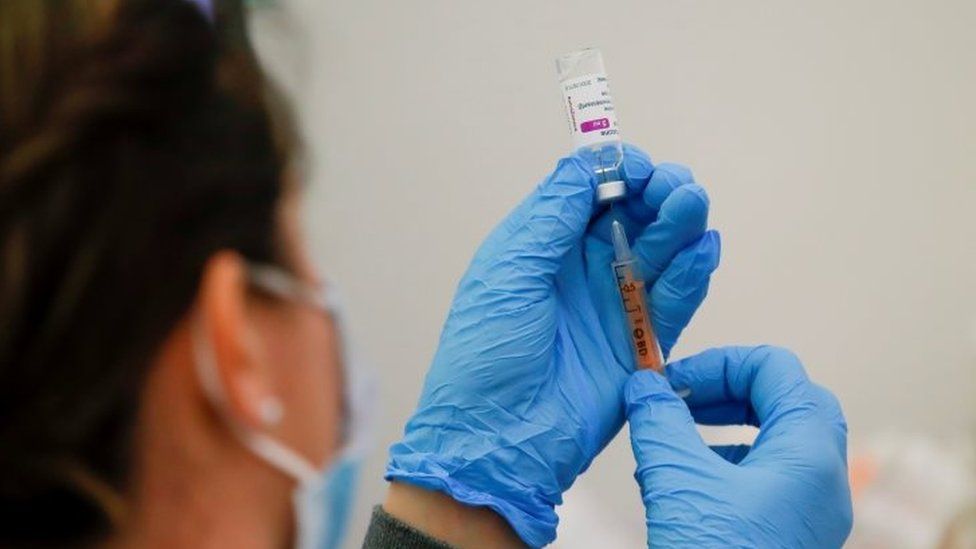People who get coronavirus after their first jab are up to 49% less likely to pass it on, research suggests.

image copyrightReuters
A single dose of a coronavirus vaccine can reduce household transmission of the virus by up to half, a study shows.
Those given a first dose of either the Pfizer or AstraZeneca vaccines – and who became infected three weeks later – were between 38% and 49% less likely to pass the virus on than unvaccinated people, PHE found.
Health Secretary Matt Hancock described the study’s results as “terrific news”.
He has urged “everybody to get their vaccines as soon as they are eligible”.
In the study, protection against Covid was seen from about 14 days after vaccination, with similar levels of protection regardless of age of cases or contacts, PHE said in a statement.
It added that this protection was on top of the reduced risk of a vaccinated person developing symptomatic infection in the first place, which is around 60 to 65% – four weeks after one dose of either vaccine.
Dr Mary Ramsay, head of immunisation at PHE, said: “Vaccines are vital in helping us return to a normal way of life. Not only do vaccines reduce the severity of illness and prevent hundreds of deaths every day, we now see they also have an additional impact on reducing the chance of passing Covid-19 on to others.”
But, while she said the findings were “encouraging”, she said it was important people continue to act like they have the virus, “practise good hand hygiene and follow social distancing guidance”.
Households are high-risk settings for transmission, meaning the study provides early evidence on the impact of vaccines in preventing onward transmission, PHE said.
Similar results could be expected in other settings with similar transmission risks, such as shared accommodation and prisons, it added.
University of Warwick epidemiologist Mike Tildesley said the findings were significant but pressed people to continue to take up vaccination offers.
“We need to remember these vaccines are not 100% effective either at preventing severe symptoms or at allowing yourself to be infected but the evidence is suggesting they are providing at least some level of protection from passing the virus on if you do get infected,” he told BBC’s Breakfast.
He said the study was extra evidence that as many people as possible needed to be vaccinated, even if they are not at risk of developing severe symptoms, in order to get much higher levels of protection across the population and reduce the number of people who get severely ill and die from the disease.


This is the latest piece of evidence to indicate that vaccines are slowing the transmission of the virus as well as saving lives.
Households are among the most likely places for infection to spread, so these set of results are particularly encouraging.
Public Health England has said it would expect similar results in other high-risk settings, such as shared accommodation and prisons.
All this bodes well for the continued easing of restrictions, especially as the vaccination campaign is making good progress into younger age groups – who are more likely to spread the virus.
And it also gives further reassurance to those concerned about the fact that children will not be vaccinated – and so might bring infection into households.
A cause for concern, though, is whether newer variants of the virus, which might be more resistant to vaccines, might cause a new surge in infections.
But the expert opinion is that the current vaccines will provide a significant degree of protection, especially against severe illness.



The study, which has yet to be fully peer-reviewed, included more than 57,000 contacts from 24,000 households in which there was a lab-confirmed coronavirus case that had received a vaccination, compared with nearly one million contacts of unvaccinated cases.
Contacts were defined as secondary cases of coronavirus if they tested positive two to 14 days after the initial household case. Most of the people in the study were under the age of 60.
Previous PHE studies have shown that both the Pfizer-BioNTech and Oxford-AstraZeneca vaccines are highly effective in reducing Covid-19 infections among older people, with 10,400 deaths prevented in over-60s by the end of March.
PHE is also undertaking separate studies on the effect of vaccination on transmission in the wider population.